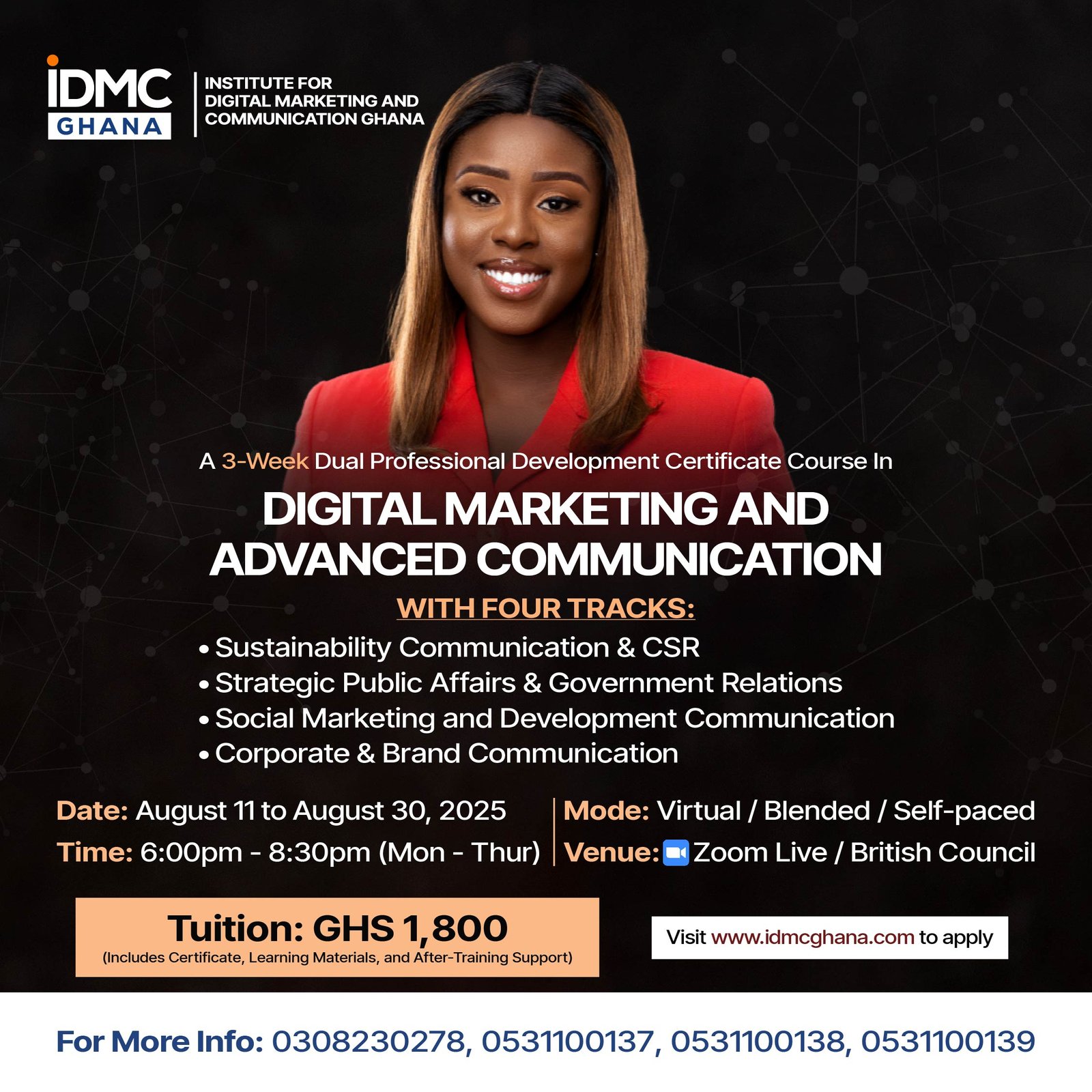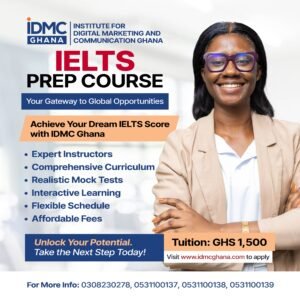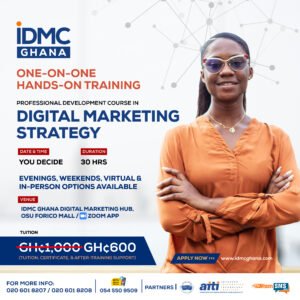DATE: August, 11 to August 30, 2025
TIME: 6;00PM – 8:30 PM Daily
MODE OF DELIVERY: Zoom / British Council (Virtual with last session Graduation both virtual and in-person at the British Council)
COURSE OVERVIEW
You’re probably familiar with the saying, “Build a better mousetrap, and the world will beat a path to your door.” According to Harv Eker, that’s only true if you add five words: “if they know about it.”
Persuasion is a crucial skill in business, as it allows people to buy from, do business with, or work with a company. Mastering persuasive communication can win support, unify teams, and encourage collaboration. However, most people lack this ability, and few possess it. Communication is essential for every industry and organization, and digital marketing has become a leading marketing tool.
This course will address internal and external communication, exploring digital marketing, stakeholder identification, management, branding, and public speaking abilities.
This short course will address both internal and external communication and explore the communication fields from different perspectives to arrive at a holistic view: digital marketing and communication, stakeholder identification and management, branding, Public Speaking abilities, etc.
Click HERE to Apply Now and Pay Later
ABOUT THE DUAL PROFESSIONAL DEVELOPMENT CERTIFICATE COURSE
This 3-weeks intensive training in Digital Marketing and Advanced Communication will provide you with effective communication strategies to promote innovation, enhance public awareness, and create a favourable image for your brand.
The DMAC course is designed to give you the tools you need to improve your communication skills and the most successful strategies for using them to your advantage, especially in this digital age.
Our ten qualified and experienced facilitators will help sharpen your communication skills to leverage the power of the world’s most advanced platforms and tools to your competitive advantage. Master communication strategies, effective presentations, branding, crisis communication, and stakeholder management.
In this highly competitive business environment, this Unique Digital Marketing Communication Masterclass with four main tracks is a great combination and an option for participants who have a passion for strategic communication and the following:
- Sustainability Communication and CSR
- Strategic Public Affairs and Government Relations
- Social Marketing and Development Communication
- Corporate & Brand Communication
Upon completion of the course, participants will be awarded a professional certificate in Digital Marketing and Advanced Communication and another certificate in any of the chosen specializations above.
WHY TAKE THIS COURSE?
The basic roles of marketers and communication practitioners keep changing, and the ordinary curriculum and classroom lessons do not catch up with them. The Digital Marketing and Advanced Communications course familiarize you with emerging marketing and corporate communication trends.
WHO SHOULD ATTEND?
- Highly motivated individuals who see the value in improving their communication skills across all of their interactions to increase their personal and professional impact
- Professionals who want to use nuanced communication skills to extend their influence and embrace larger leadership roles
- Leaders who want to elevate their communication delivery and practises to craft compelling messages and presentations for their teams
- Public Relations Professionals, Marketers, Communications Professionals, etc.
- Content Manager, Communication Officer, Social Media Marketer, Communications and media Coordinator, etc.
- People who want to learn the basics of Digital Marketing.
- Small Business Owners who want to increase their sales and revenue through digital media
- Entrepreneurs who want to leverage the power of the world’s most advanced advertising platforms to their competitive advantage
CAREER PATHS
- Communication Officer / Director
- Digital Marketer
- Community Manager
- Content Developer
- Public Relations Manager
- Health / Development Communicator
- Freelance Digital Marketer
- Political Communicator or Strategist
- Any other professional who would like to improve their spoken communication at an advanced level
Click HERE to Register Your Interest and Pay Later
COURSE REQUIREMENTS
- At least a Diploma in any field
- Laptop or smartphone
- Internet Access
- Interest in Digital Marketing and Communication
Our Training pledge to you and your organization
After this training, you’ll have the benefit of, but are not limited to, the following:
- Understand Digital Marketing: Overview, Background, Concepts and Terminologies
- Develop, implement and manage an effective Digital Media Strategy for an organization
- Set up an effective Corporate Communications function (including internal communications, media relations, and external communications) to ensure it adds value to your organization
- Identify, map, and meet your stakeholders’ needs for Corporate Communications
- Conduct a Communications Audit to capture current capabilities and future needs
- Develop a corporate communications strategy and plan for your organization which aligns with business fundamentals, captures stakeholder needs, and optimizes the channels available to you.
- Manage difficult messages during organizational or industry change, crisis and reputation management, and handling customer complaints.
- Plan and execute corporate communication programs and social media campaigns internally and externally.
- Individuals become excellent at spoken communication, and their skills will reflect positively on your business.
- More calibration and streamlining in communication, aligned with the brand values of your organization
- Greater credibility for the individual, the organization, and the brand value
- Market credibility increases because of stakeholder recommendations, owing to high communication standards.
- Improved individual performance and sense of appreciation for the organization
- A clear understanding of the role of advanced communication skills in professional interactions
- Overall improvement in individual performance owing to increased competency in communication
Plus, knowledge, skills, and learning outcomes in any of the chosen tracks.
MODULES
Module 1
Digital Marketing and Communication
We’ve moved from ‘the attention economy (push)’ to ‘the attraction economy (pull)’ to ‘the participation economy (share)’. Roberts (2010)
The Digital Marketing and Communication module of the Digital Marketing and Advanced Communication course contains insights and strategies for business owners, marketing professionals, students, and anyone looking to hone their skills and get up to speed on the latest digital marketing.
Digital marketing—the fastest-growing area of marketing we have ever witnessed—now competes for the lion’s share of an annual pot.
According to Statista, as of 2020, the Internet was considered the most important medium for advertisers, accounting for 51% of total media ad spend.
Forecast data indicates that ad spending worldwide will reach nearly 885 billion U.S. dollars by the end of 2024.
This module is a practical guide to understanding digital marketing, its potential for the growth of organizations or businesses, and creating and executing digital marketing plans. It combines established approaches to marketing planning with the creative use of new digital models and tools. It is also designed to support both marketers and communicators and students of business or marketing who want a thorough yet practical grounding in digital marketing communication.
LEARNING OUTCOMES
The course teaches you how to:
- Overview of the Digital Media Space
- Outline the benefits and risks of digital marketing
- Avoid basic digital marketing mistakes
- Develop, implement, and manage a Digital Media Strategy
- Define the most important social media KPIs
- Plan, Implement and Evaluate social media campaign
- Draw up an outline of a digital marketing plan
- Evaluate and apply digital marketing principles and models
- Integrate online and offline communications
- Build an Effective Advertising Strategy using Sales Funnels
- Implement customer-driven digital marketing
- Reduce costly trial and error
- Measure and enhance your digital marketing
- Learn best practises for reaching and engaging your audiences
- Transform your business/organization with Digital Marketing
Key Topics to be covered: Digital Strategy Development, Content Marketing & SEO, Email Marketing, Mobile Marketing, Influencer Marketing, Google Ads, Master Bulk SMS Campaigns, and Inbound and Outbound Strategies.
Module 2
Social Media Marketing
Brands are either part of the conversation or they’re not; as a result, they’re either part of the decision-making cycle or absent from the connected customer’s heart, mind, and actions. Solis (2011a)
In the past, budgets have been an overwhelming deciding factor in a brand’s share of voice. A large advertising budget increased brand awareness. Today, big brands with small budgets, small businesses, startups, and nonprofits can use social media to help level the playing field.
A social media strategy can make a difference at almost any budget level. The viral spread via consumer views and shares, plus the earned media opportunities that spread views and shares even further, make a difference in driving visibility to reach mass audiences.
Social Media Marketing is currently the most powerful tool that can help businesses (whether small or not) reach customers and prospects. But with over 88 per cent of all the companies marketing their businesses on at least one social media platform, you can see how easy it can be for your brand to get lost in all that noise.
Social media is a dynamic communication tool that has significantly changed the public relations industry. You will learn to think strategically about which platforms are the best way to communicate with diverse target audiences and how to open authentic communication with your audience.
LEARNING OUTCOMES
- Understand the relevance of social media to business
- Define methods to set goals for social media and measure its effectiveness
- Identify the components of a social media strategy
- Review options for listening to customer conversations
Define methods to use different forms of content to engage online audiences - Demonstrate how social media can be integrated into the communications strategy
- Develop an understanding of practical approaches to improve marketing on the main social networks
- Understand approaches to increasing the returns from social media marketing
- Learn how to create Facebook ads
- Scale Your Advertising with Ads Manage
Key Topics to be covered: Social Media Marketing and why it is important, Social Media strategy and plan, Social Media Advertising, Analytics – Measuring & evaluating, Social listening and online reputation management, Developing the content marketing and engagement strategy for your brand, social media communications strategy, Social media optimization, etc.
Module 3
Communications Management
One certainty about the future of communication is that it will be uncertain. As the social media revolution accelerates, consumers are more responsible for your brand. We have been deep into the Age of the Consumer for some time, but the pandemic accelerated their takeover, putting them firmly in charge of 2022 and beyond. They want more personalized content. They want faster service. They want better experiences. And they want it all now. For your brand to survive, you must listen and respond to their demands.
These things bring new threats and opportunities to an organization’s brand, reputation, and survival.
This one-month intensive training will provide you with effective communication strategies to promote innovation and enhance public awareness.
The basic roles of marketers and communication practitioners keep changing, and the ordinary curriculum and classroom lessons do not catch up with them. The Digital Marketing and Corporate Communications course familiarizes you with emerging marketing and corporate communication trends. Our qualified and experienced facilitators will help sharpen your communication skills to leverage the power of the world’s most advanced platforms and tools to your competitive advantage.
LEARNING OUTCOMES
- Develop a Corporate Communications Strategy and Plan for your organization which aligns with business fundamentals, captures stakeholder needs, and optimizes the channels available to you.
- Plan and execute corporate communication programs and campaigns internally and externally.
- Adapt to various avenues of communication within the organization
- Set up an effective Communications function (including internal communications, media relations, and external communications), to ensure it adds value to your organization
- Identify, map, and meet your stakeholders’ needs for Corporate or organizational Communications
- Conduct a Communications Audit to capture current capabilities and future needs
- Manage difficult messages, including during times of organizational or industry change, crisis and reputation management, and handling customer complaints
- Act as a Strategic Communications Business Partner by understanding your role as a trusted advisor, the importance of personal influence, and the relationship between internal communications, employee engagement, and customer satisfaction.
Key Topics to be covered: – Communication Strategy Development, crisis and reputation management, Brands Management, Contemporary media relations management, Stakeholder engagement, management, and communication
Click to Register Your Interest and Pay Later
NB: LEARNERS ARE TO SELECT JUST ONE OF THESE TRACKS FOR SPECIALIZATION & CERTIFICATION
Optional Track 1
PUBLIC AFFAIRS AND GOVERNMENT RELATIONS
OVERVIEW
Public Affairs and Government Relations is a comprehensive course designed to provide students with a deep understanding of the intricacies of the public policy landscape and the skills necessary to engage effectively in government affairs and advocacy. This course explores the intersection of government, business, and civil society, focusing on organisations’ strategies and techniques to navigate the complex world of public affairs.
Students will examine the roles of government relations professionals, lobbyists, and public affairs experts in shaping public policy and influencing decision-makers.
TARGETS:
This course is designed for individuals interested in or working in government relations, public affairs, lobbying, advocacy, and related fields. It is precious for:
- Government Affairs Professionals: Individuals seeking to enhance their skills and knowledge in government relations and public affairs
- Advocacy and Lobbying Specialists: Professionals looking to improve their ability to advocate for their organisations or causes effectively
- Business Leaders: entrepreneurs, executives, and managers who want to understand the impact of government policies on their organizations.
- Nonprofit and NGO Leaders: Individuals working in the nonprofit sector interested in influencing government decisions and public policy
- Anyone Interested in Public Policy: Students and individuals are generally interested in how government policies are formed and how they can participate.
LEARNING OUTCOMES
By the end of this course, participants will be able to:
-
- Understand the foundations of public affairs and government relations, including the structure of government, key decision-making processes, and the role of stakeholders.
- Analyze and assess the impact of government policies on various sectors, industries, and organizations.
- Develop effective strategies for engaging with government officials, legislators, and regulators.
- Create and implement advocacy campaigns and grassroots efforts to influence public policy.
- Navigate the ethical and legal considerations associated with government relations and lobbying.
- Build relationships with key stakeholders, including government representatives, interest groups, and the media.
- Evaluate the success of government affairs initiatives and adjust strategies as needed.
- Develop and present compelling arguments and positions on public policy issues.
- Effectively communicate complex policy issues to diverse audiences.
- Stay informed about emerging trends and developments in public affairs and government relations.
Optional Track 2
SOCIAL MARKETING AND DEVELOPMENT COMMUNICATION
OVERVIEW
Development Communication integrates strategic communication in development projects, aiming for behaviour change rather than just information dissemination or awareness-raising. This course aims to create an experience for change and understand contemporary development communication processes.
Social marketing, a combination of commercial marketing and social sciences, is a proven tool for influencing behaviour sustainably and cost-effectively. It explores principles of marketing and strategic communication to achieve human behaviour change towards a social purpose or good.
This course empowers participants to leverage marketing and communication strategies for the betterment of society. By combining theoretical knowledge with practical skills, individuals will be prepared to contribute to meaningful social change and development through impactful and ethical communication practices.
TARGETS
This course is designed for individuals passionate about positively impacting society through strategic communication and marketing. It is particularly valuable for:
-
- Social Entrepreneurs: Individuals seeking to apply marketing principles to address social issues and drive positive change.
- Development Professionals: Those working in community development, NGOs, and international development interested in enhancing their communication skills.
- Marketing and Communication Specialists: Professionals looking to apply their skills to social causes and contribute to meaningful projects.
- Advocacy and Nonprofit Professionals: Individuals engaged in advocacy work and nonprofit organizations aiming to improve their outreach and impact.
- Government and Public Sector Professionals: Public servants interested in leveraging communication strategies to address social challenges.
- Students and Enthusiasts: Anyone with a passion for social change and a desire to learn how marketing and communication can be powerful tools for positive impact.
LEARNING OUTCOMES
Upon completion of this course, participants will be able to:
-
- Understand the principles and ethics of social marketing and development communication.
- Analyze social issues and identify target audiences for social marketing campaigns.
- Develop effective communication strategies to promote behaviour change and address social challenges.
- Apply marketing techniques to social marketing initiatives, including segmentation, positioning, and branding.
- Utilize digital and traditional media channels to reach and engage diverse audiences in support of social causes.
- Design and implement social marketing campaigns that align with development goals and priorities.
- Measure and evaluate the impact of social marketing initiatives using relevant metrics and indicators.
- Collaborate with stakeholders, including community members, NGOs, and government agencies, to enhance the reach and effectiveness of campaigns.
- Navigate cultural and contextual considerations in designing communication strategies for diverse communities.
- Create comprehensive social marketing plans integrating research, strategy, and execution to address specific social issues.
Optional Track 3
CORPORATE BRAND COMMUNICATION
OVERVIEW
Marty Neumeier’s book Brand Flip highlights the power shift from companies to customers, with people now focusing on meaning rather than products. Brand management is crucial in this era, as it creates and sustains a strong brand that makes customers committed to a business, differentiates products from competitors, and provides a quality image. Companies worldwide invest millions in strategies to reinvent their profiles, benefiting from well-managed reputations in both soft and tangible ways.
Organizations that manage their reputations well benefit in so-called soft, feel-good ways and in quantifiable, bottom-line ways. Organizations that ignore the reputational effects of their actions pay the consequences over the long term, as the rash of business scandals since 2002 has shown. And the consequences range from soft, embarrassing ones to the organisation’s dissolution.
This course emphasizes the importance of aligning communication strategies with organizational goals, values, and culture, offering insights into developing impactful brand narratives and managing corporate reputation.
TARGETS
- Corporate Communication Professionals: Individuals responsible for shaping and disseminating corporate messages internally and externally.
- Marketing and Brand Managers: Professionals seeking to strengthen their understanding of corporate brand communication to enhance brand equity.
- Public Relations Practitioners: PR specialists aiming to integrate corporate brand communication strategies into their campaigns.
- Business Leaders and Executives: Decision-makers interested in aligning corporate communication with overall business objectives.
- Communication Strategists: Individuals involved in developing communication plans and strategies for organizations.
- Aspiring Brand Consultants: Those looking to enter the field of brand consulting and advising organizations on effective brand communication.
LEARNING OUTCOMES
- Understand Corporate Identity, Image, and Reputation
- Understand the role and significance of corporate brand communication in shaping perceptions and building brand equity.
- Develop a comprehensive understanding of corporate brand identity, including brand values, personality, and positioning.
- Craft and communicate a compelling brand narrative that resonates with internal and external stakeholders.
- Implement effective strategies for managing and enhancing corporate reputation.
- Navigate the crisis communication challenges and develop crisis management plans to protect corporate brand image.
- To reach diverse audiences, utilize various communication channels, including traditional and digital media.
- Foster internal alignment by ensuring that corporate communication reflects organizational values and culture.
- Analyze and interpret data and feedback to measure the effectiveness of corporate brand communication initiatives.
- Integrate storytelling techniques into corporate communication to create engaging and memorable brand experiences.
- Develop a strategic corporate brand communication plan that aligns with organizational goals and objectives.
Optional Track 4
SUSTAINABILITY COMMUNICATION AND CSR
OVERVIEW
In an era where environmental consciousness and social impact are paramount, organizations face increasing pressure to communicate their sustainability efforts authentically and effectively. This intensive short course on Sustainability Communication and Corporate Social Responsibility (CSR) is designed to equip professionals with the strategic insights and practical tools needed to navigate this critical landscape.
Participants will gain a comprehensive understanding of what CSR truly entails beyond mere philanthropy, delving into its strategic integration within business operations. The module will explore the principles of effective sustainability communication, teaching how to craft compelling narratives that resonate with diverse stakeholders – from investors and consumers to employees and regulatory bodies. You will learn to identify key sustainability issues, develop transparent reporting mechanisms, and leverage various communication channels to build trust and enhance brand reputation.
Through a blend of theoretical frameworks, real-world case studies, and practical exercises, attendees will develop the skills to design, implement, and measure impactful CSR initiatives and communicate their sustainability journey with integrity.
TARGETS:
This course is ideal for professionals seeking to enhance their organization’s commitment to responsible business practices and articulate that commitment persuasively. It is particularly beneficial for:
- Marketing & Communications Professionals: To effectively manage brand reputation and public perception around sustainability.
- Public Relations Specialists: To build trust and positive relationships with stakeholders through ethical communication.
- Sustainability Managers & Coordinators: To develop and communicate their organization’s CSR strategies.
- Human Resources Managers: To integrate CSR into employee engagement and talent attraction/retention strategies.
- Business Leaders & Managers: To understand the strategic value of CSR and sustainability in driving business growth and resilience.
- Aspiring Professionals: Those looking to build a career at the intersection of business, ethics, and communication.
LEARNING OUTCOMES:
Upon successful completion of this course, participants will be able to:
- Distinguish between CSR and Sustainability, articulating their strategic value for organizations.
- Identify and analyze key stakeholder groups for effective sustainability engagement.
- Craft authentic and compelling communication messages about sustainability initiatives.
- Select and utilize appropriate communication channels for diverse sustainability narratives.
- Understand and apply foundational sustainability reporting standards for transparent communication.
- Develop strategies to avoid “greenwashing” and ensure genuine sustainability communication.
- Measure the impact and effectiveness of sustainability communication campaigns.
- Propose methods to integrate CSR principles into core business strategies and operations.






Reviews
There are no reviews yet.